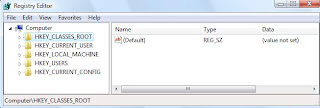How can we Open Registry Editor in your windows Operating System
 Windows Registry :
Windows Registry :Windows registry is a hierarchical database that stores configuration settings and options on Microsoft Windows operating systems. It contains settings for low-level operating system components as well as the applications running on the platform: the kernel, device drivers, services, SAM, user interface and third party applications all make use of the Registry. The registry also provides a means to access counters for profiling system performance.
How to open windows registry editor:
1. press [Win]+ [R] key in the keyboard or go to Start >> RUN.
2. Write regedit and hit enter.
3. in case of windows Vista and Win-7 granting the permission and click on continue button.
4. Finally you will see a screen with some of the specific folder structure and ready for editing.
Structure:
1. press [Win]+ [R] key in the keyboard or go to Start >> RUN.
2. Write regedit and hit enter.
3. in case of windows Vista and Win-7 granting the permission and click on continue button.
4. Finally you will see a screen with some of the specific folder structure and ready for editing.
Structure:
The registry contains two basic elements: keys and values.
Registry keys are similar to folders — in addition to values, each key can contain subkeys, which may contain further subkeys, and so on. Keys are referenced with a syntax similar to Windows' path names, using backslashes to indicate levels of hierarchy. Each subkey has a mandatory name which is a non-empty string that cannot contain any backslash or null character, and whose letter case is insignificant.
E.g. HKEY_LOCAL_MACHINE\Software\Microsoft\Windows refers to the subkey "Windows" of the subkey "Microsoft" of the subkey "Software" of the HKEY_LOCAL_MACHINE root key.
There are seven predefined root keys, traditionally named according to their constant handles defined in the Win32 API, or by synonymous abbreviations (depending on applications):
- HKEY_LOCAL_MACHINE or HKLM
- HKEY_CURRENT_CONFIG or HKCC (only in Windows 9x/ME and NT-based versions of Windows)
- HKEY_CLASSES_ROOT or HKCR
- HKEY_CURRENT_USER or HKCU
- HKEY_USERS or HKU
- HKEY_PERFORMANCE_DATA (only in NT-based versions of Windows, but invisible in the Windows Registry Editor)
- HKEY_DYN_DATA (only in Windows 9x/ME, and visible in the Windows Registry Editor)
Labels
Registry Tweaks





Post A Comment
No comments :